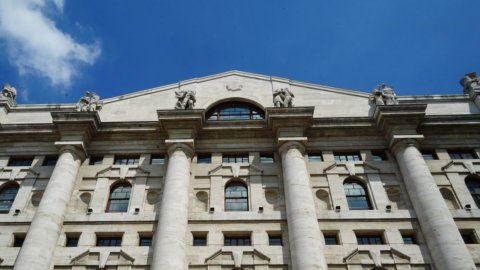The outputs of Powell and ECB anticipate a 0,75% rate hike. Short bets at a two-year high on Wall Street. And tomorrow Gazprom closes the gas taps for three days.
Dollar up sharply to 0,9927 against the euro while I US bond yields (two-year bonds at their highest since 2007), the race for increases in BTPs and cousins from Spain and Portugal is pulling ahead. The 3,12-year Treasury Note is up 7% this morning, up 1,38 basis points. The Bund closed Friday at 3,68%. BTPs at XNUMX%. The reaction of the markets to the indications of the central bankers that emerged at Jackson Hole, anticipating the rate hikes scheduled for September and beyond, is not limited to equity lists. But, combined with the effect of the gas flying into the Amsterdam gambling den (which doesn't deserve the stock market title) and the threats nuclear of the war in Ukraine, the forecast for stock exchanges is very gloomy.
Asia down, European futures down, US shorts at two-year highs
- The future of the EuroStoxx 50 index loses 1,1%.
- The positions short on US markets are at a two-year high, according to the Wall Street Journal. The Nasdaq closed nearly 4% down on Friday.
- In Asia Pacific, Tokyo's Nikkei fell above all, -2,7%. Seoul's Kospi is also bad, -2,5%. BSE Sensex -1,7% at the start of the session.
- The damages for the Chinese stock exchanges and Hong Kong are more limited. Supporting the lists is the prospect of an agreement between the supervisory authorities of China and the USA on the accounting controls of Chinese companies listed on the Nasdaq. The risk of a generalized delisting is removed.
- In Asia, most currencies suffer from the strength of the dollar. The yuan China and Japan's yen are down 0,5% and 0,7%. South Korean won -1,3%.
- Gas at the Dutch node closed on Friday down 1% at 307 euros per MWh. Gazprom's quarterly data will be released today.
- Petroleum WTI up 1% to $94,2. Brent at $102.
- Gold is at a four-week low at $1.725 an ounce, -0,7%.
The tightening of the central banks imprisons the Bull
With these numbers, the financial markets are preparing to deal with the flurry of rate hikes anticipated by Jerome Powell to Jackson Hole. After the words of the president of the Fed, determined to fight inflation at any cost (employment and incomes included), the European bankers reaffirmed the line of rigor: the Frenchman Villeroy de Galhau said that another hike " significant” in interest rates is a necessary step in September. And the German colleague Isabel beak, from Jackson Hole, admitted that the risks of recession have increased "Even if we enter a recession - he said -, we have very few choices but to continue on the path of normalization". In figures, perhaps an initial half point increase in the cost of money will not be enough either for the Eurozone or for the Fed, which is on the way to a new increase of 0,75%.
An acceleration that promises to make the superdollar fly and multiply the already serious problems of Emerging Countries.
Gazprom's stop risks causing gas to skyrocket
The preliminary data on inflation in the Eurozone for August will be decisive, due out Wednesday at the same time as the (hopefully) temporary suspension of gas supplies by Gazprom, the latest provocation that threatens to push the gas price beyond records scored in Amsterdam, where the barrier of 340 euros per megawatt hour was broken at the end of the week. In short, monetary policy intersects with the choices that the EU will have to make in a short time to avoid a recession. It is the mission that will also be up to the Government Draghi, also called upon by the parties to take decisions that cannot wait for the elections on 25 September. The decisions of the executive will be at the center of the Ambrosetti meeting, the traditional end-of-summer appointment (scheduled for September 2nd to 4th) which compares the various protagonists of the Italy puzzle.
Data for the week: inflation, unemployment and the labor market
On Tuesday, Germany will communicate the data relating to theAugust inflation. Wednesday, however, will be the turn of Eurostat ed Istat. Data will be released on Thursday unemployment in July in Italy and in the EU.
In the US, the index will be monitored on Tuesday Ism manufacturing, in light of the recent deterioration in the new orders component. Also on Tuesday will be releasedUS Consumer Confidence Index, expected to improve slightly. But the key figure, as usual, will be the publication of data on job market in August. With something new: this time the Fed hopes for a slowdown in hiring and wages, the first condition for curbing the race in prices which, unlike in Europe, does not depend on expensive energy overseas.
On the Asian front, attention will be paid on Wednesday to ai manufacturing PMI and Chinese services in Augustafter the industry contracted last month. But unlike in 2008, the Chinese locomotive appears too weak to pull the convoy of the rapidly deteriorating global economy.





